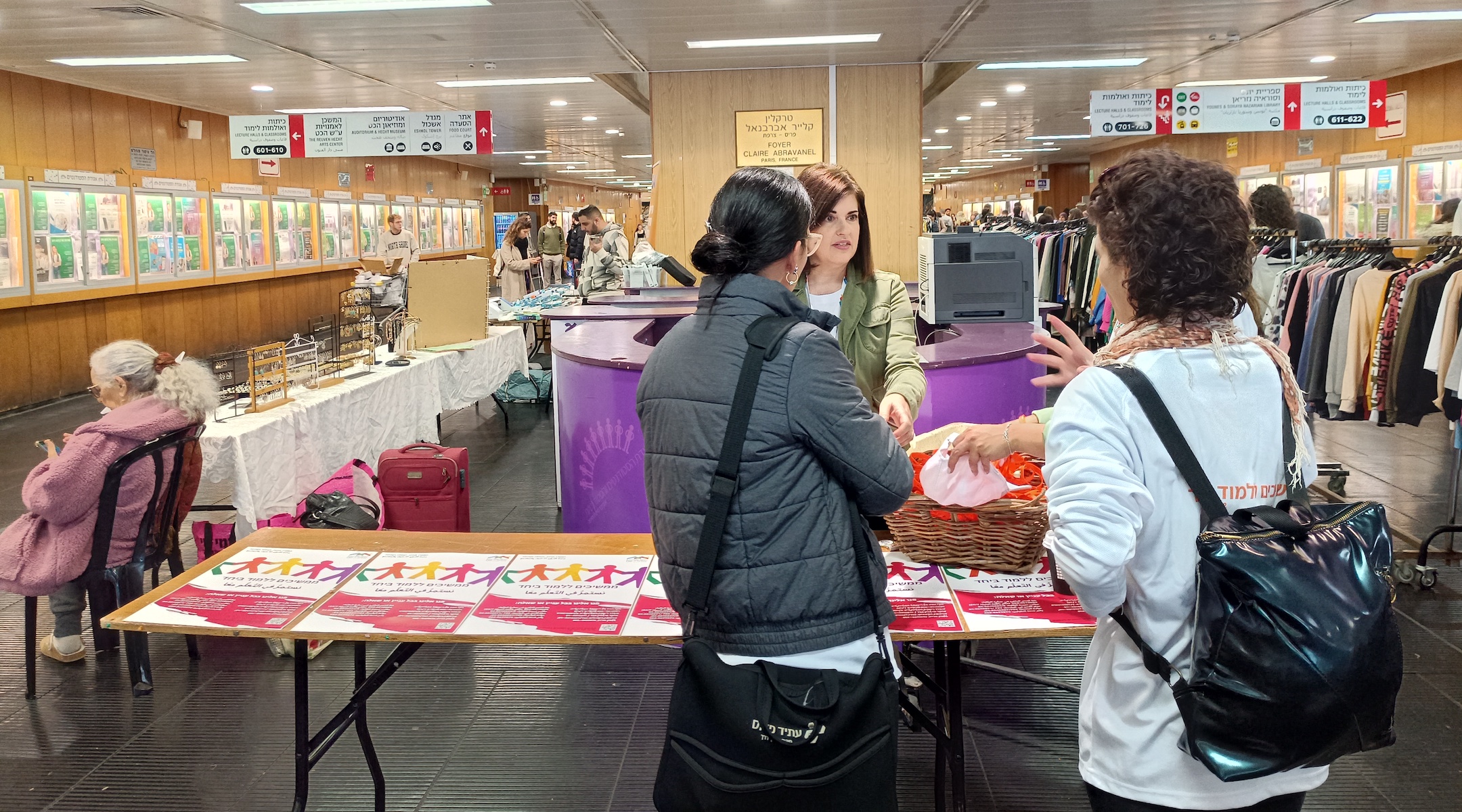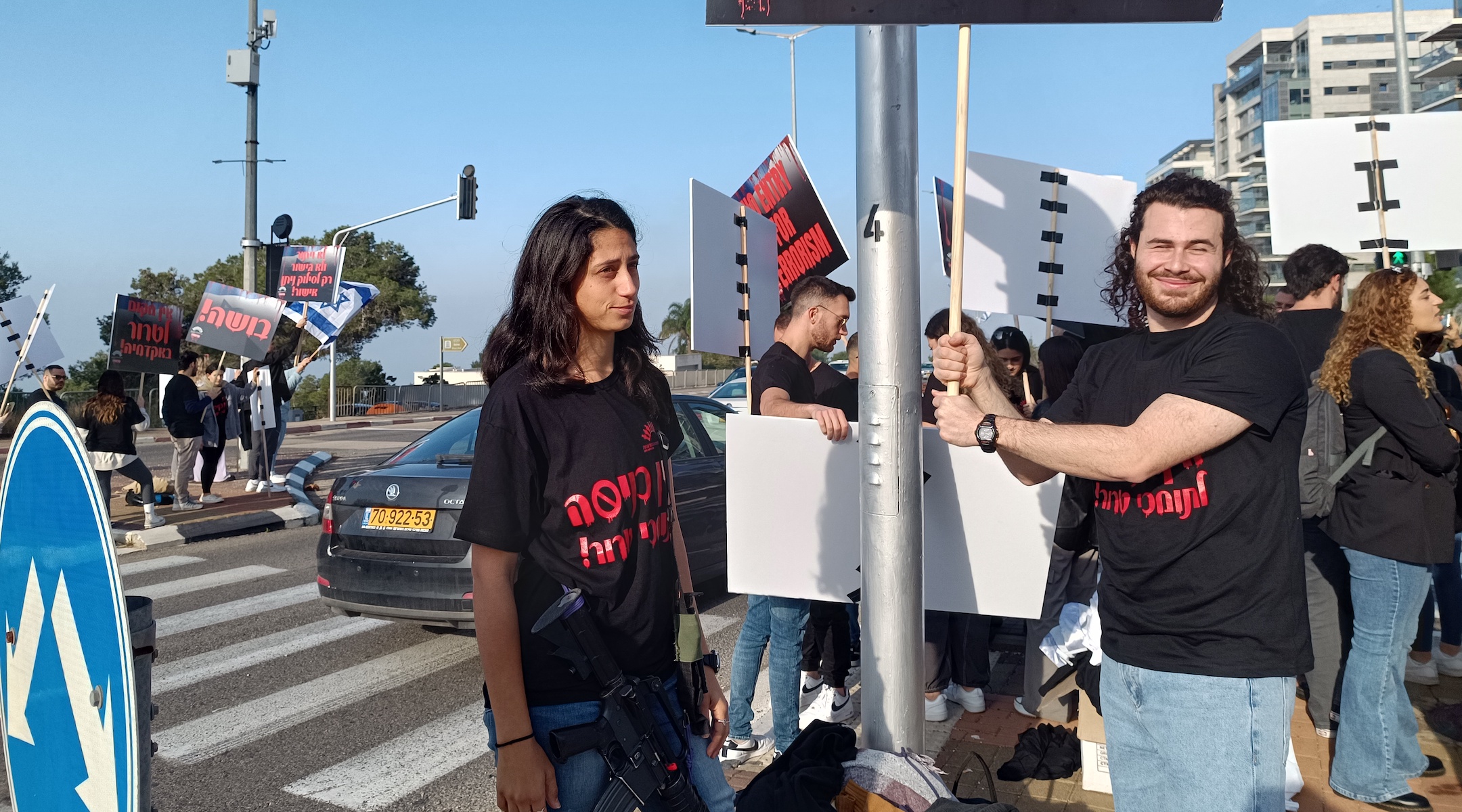HAIFA (JTA) — In the days leading up to her university’s long-delayed first semester, Yael Granot-Bein brought a group of Arab and Jewish students together.
Granot-Bein, who works in the University of Haifa’s dean of students office, had envisioned working with the students to come up with a way to demonstrate solidarity during a war that was testing bonds at the school, which enrolls the highest proportion of Arabs of any Israeli university.
“I said, ‘Let’s think together about a catchphrase that we can put on T-shirts and bracelets.’ In my mind, I had something like, ‘Let’s keep a diverse campus safe,’” Granot-Bein recalled. “They looked at me and were very honest and said, ‘Listen, that is not appropriate. We are not on the same page at all.”
It was a dramatic and disappointing conversation at an institution that has been a rare oasis of shared society in a country whose roughly 7 million Jewish citizens and 2 million Arab ones live in largely separate spheres. Except in a handful of cases, Jewish and Arab children are educated in separate schools until reaching university, and are generally more comfortable communicating in different languages.
At Haifa University, which resumed classes on Dec. 31 alongside the rest of Israel’s universities, Israeli Arabs make up half of the 17,000-person student body. In a typical year, Jewish and Arab students from Muslim, Christian and Druze backgrounds choose to study at Haifa in part for its reputation as Israel’s most diverse campus environment. In addition, Haifa is a cultural center for Arab Israelis and is known for a history of largely peaceful coexistence between its Jewish and Arab residents.
Since the outbreak of the Israel-Hamas war on Oct. 7, however, the atmosphere on and around campus has felt different. In the weeks after Hamas’ invasion of Israel, the university took the unprecedented step of suspending eight Arab-Israeli students for posts on social media and WhatsApp groups that were deemed to be supporting terror.
This month, those students were allowed back on campus while their cases undergo a mediation process — sparking calls by some Jewish student leaders for a “day of disruption” in protest of that decision.
“We demand that they stay off campus until the process is completed,” Elad Asis, the student government president, told the Jewish Telegraphic Agency as he led a rally of dozens of students holding signs at the campus entrance at the start the second week of classes on Jan. 9. “It is not possible that students who supported terrorism will sit next to students whose family members were murdered on Oct. 7.”
According to Adalah, an Arab-Israeli legal rights nonprofit, more than 100 Arab students across the country have faced disciplinary proceedings over social media posts related to the war, at least eight of whom were expelled.

The university administration handed out materials with the slogan “Continuing to study together” in order to cool tensions. (Eliyahu Freedman)
The suspensions have had a sweeping impact at Haifa, where several campus community members had family members killed on Oct. 7 and one student’s parents were kidnapped by Hamas. A campus exhibition illuminates one candle for each of the dozens of graduates killed in action in Gaza.
“I understand their feelings,” Ron Robin, the university’s president, told JTA after meeting with the protesting students on the street. But he said he did not think there was a significant problem on the campus, adding, “I think that if there’s anybody in the university who has sympathy for Hamas I can count on one hand.”
About 1,500 Haifa students were called up to reserve duty as the Israeli army mounted its largest-ever mobilization in the days after the attack. Some of them have now returned to campus, carrying their guns per military policy as they navigate the new tensions. The university is recording classes for the time being, in part so soldiers on active duty can stay caught up; it is also awarding scholarships worth about $530 to all students called up to the army. Annual tuition is approximately $3,000.
“Someone told me that it felt good for her seeing me with my weapon and that it made her feel safe, and someone else saw my weapon and it allowed her to feel comfortable to talk about her difficulties during the war,” said Avinoam, 27, a reservist who is scheduled to alternate weeks between campus and serving on one of Israel’s borders with his army unit. (Per military policy, he shared his first name only.)
The sight of armed students across campus is less comforting for Annabell Sharma, an Arab political science student. Sharma said she was alarmed by the anger on campus about the nine students who had been suspended.
“It is possible that I will be assaulted, not necessarily physically, on the basis of nine students,” she said. She added, “Why bring a weapon to campus, when that is supposed to be the job of campus security? If someone wakes up on the wrong side of the bed and decides to fire upon all of us, then what?”
The tensions at Haifa are far from unique. According to a November survey of Arab and Jewish Israeli students commissioned by the Edmond de Rothschild Foundation, most Jewish and Arab students fear the other, with around 20% of each feeling that fear to a high degree. The survey also found that nearly half of Arab students were considering not returning to campus.
The survey was taken weeks after Arab students were evacuated from the dorms at Netanya Academic College in late October after Jewish residents rioted outside, calling for “Death to Arabs.”
At Haifa, Sharma said she blamed the tensions felt by Arab students at Haifa on a small group of Jewish extremists who have in some cases doxxed and harassed Arab students for writing posts on social media and Whatsapp that they feel are disloyal to Israel. Sharma called the group of Jewish extremists “an obstacle,” and added, “fanatics on both sides need to be restrained without favoritism.”
Granot-Bein said that after the initial tension during her slogan-brainstorming session with students, she was able to resume her original plan by pressing the students to name things they all had in common.
“They said, ‘We want to study, we want to graduate and we want to move on with our lives,’” she recalled.
A boiled-down version of their message — “Continuing to study together” — can now be seen on staff T-shirts and thousands of orange bracelets worn by students across campus that were handed out by professors and volunteers during class breaks at the start of the semester.
Maya Negev, a professor of public health who was handing out bracelets near the main library, emphasized that all members of Israeli society reflected in Haifa’s population have stepped up during the war, from Druze soldiers to Arab Israeli nurses.
“Everyone in the [Department of Public Health] is helping a lot. A lot of Arab medical staff have been covering for Jewish colleagues who are out on reserve duty,” she said.
Medicine has long been one of the most integrated sectors of Israeli society. Hamada, a Muslim student in her final year of nursing school who declined to share her last name, said her medical training had prepared her to return to a wartime campus.
“I am not so afraid because I am used to working with a diverse group of people as a hospital worker, but I know that other students are afraid,” she said. “There is no tension for me here.”
She said an Arab-Jewish leadership course she took last year offered an example of how to build relationships. Once the students got to know each other, she said, “we were able to speak openly about everything from religion to politics to racism.”
Mona Maron, a neuroscientist and vice president for research and development who is one of the university’s most senior Arab-Israeli academics, said that even in the best of times, it can take time to break the ice between Arab and Jewish students on campus.
She was optimistic that the tensions of recent months would soon dissipate now that classes had begun.
“The first meeting of many of the Arab and Israeli students takes place on campus,” she said. “It’s true now that you see groups of Arab and Jewish students sitting separately.”
She added, “Come back in a few weeks and you will see them sitting together.”
JTA has documented Jewish history in real-time for over a century. Keep our journalism strong by joining us in supporting independent, award-winning reporting.






